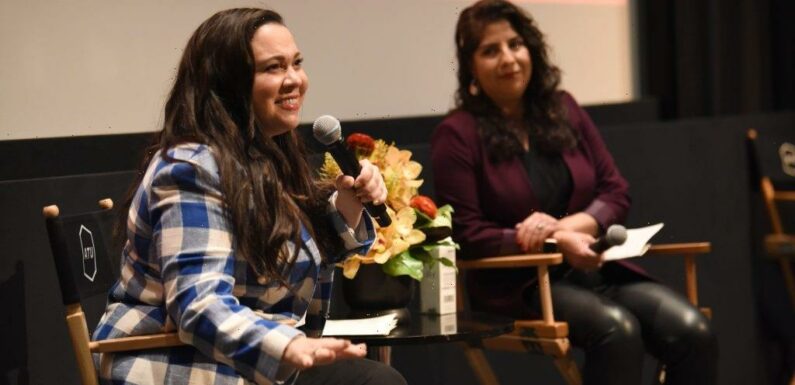
Issues of discrimination and exclusion in Hollywood are often driven by baseless beliefs about marginalized communities, and even efforts to increase diversity sometimes get stalled in the “listening phase” without prioritizing action. That’s why Harness (and organization founded by America Ferrera, Wilmer Valderrama and Ryan Piers Williams) and Untitled Latinx Project (ULP) co-produce DEAR Hollywood (Demanding Equal Access and Representation in Hollywood). The initiative focuses on concrete, data-based strategies for change.
“Latine storytellers and Latine storytelling has lived in the shadows since the advent of Hollywood. It’s always been like this,” said “Vida” creator and ULP member Tanya Saracho while opening DEAR Hollywood and UTA’s Latine Heritage Month event. “We are allowed a glimpse of light here and there, but we always go back in the shadows. We never remained in the light long enough to make substantial progress.”
“They canceled our ‘Gordita Chronicles,’” Saracho continued, referring to the coming-of-age comedy executive produced by Eva Longoria and Zoe Saldaña that HBO Max recently canceled after one season. The audience moaned in mourning.
“Why is this so? Well, lots of systemic reasons. But this erasure has become a deep wound that we must heal,” Saracho said before introducing the rest of the program.
Taking the stage to discuss his work with Harness, Valderrama said, “Studios and streaming platforms and networks finally don’t assume they have all the answers. They’ve now realized that creative collaborations [with marginalized artists] are how you not only get to the audience, but create authentic and valuable representation. Things that can ripple through multiple generations from now. If we don’t define who we are right now, then who will our children be? How will they carry their roots? How will they speak of their heritage to their children? We have to undo so much. We have to somehow retell our history so it never goes untold again.”
Next, Gloria Calderón Kellett, creator of “One Day at a Time” and “With Love,” moderated a conversation with Dr. Ana-Christina Ramón, who is the director of research and civic engagement in the division of social sciences at UCLA. Together, they discussed different statistics that prove both the power Latinos hold as media consumers and the ways that Hollywood as underserved Latino audiences and creators.
“There’s a lot of misinformation out there about who Latinos are, about what we watch. How many of you have heard, ‘They just don’t show up?’” Kellett said. “We’ve heard that again and again — but not according to her numbers. So we need to talk about this and tell the algorithm.”
One of the examples Ramón gave was that Latinos make up 18% of the U.S. population, but attend movie theaters at a rate higher than that.
“The Latinate moviegoer over-indexes in terms of how many tickets they buy and how frequently they go to the movies. We are about 24% of frequent moviegoers, which means that we go once or more a month,” she said. “We buy the most tickets per person. We buy the most tickets overall. We are excited to go to the movies, and we don’t just go by ourselves to see movies. We go with the whole family!”
Closing the night was a panel Saracho and four other Latina showrunners: Dailyn Rodriguez (“The Lincoln Lawyer), Sierra Teller Ornelas (“Rutherford Falls”), Linda Yvette Chávez (“Gentefied”) and Leah Benavides Rodriguez (“Thirst”). They discussed the “Pillars of Change,” five points devised by DEAR Hollywood in order to increase Latino representation in entertainment.
About the first pillar, Ornelas said, “No Stories About Us Without Us. Each year, we see projects centered on Latinx talent and Latinx characters being developed and greenlit with no Latinx representation at the helm. Shows like “Magnum PI” on CBS, “Narcos” on Netflix, the list goes on and on. We need to be in charge of telling our own stories.”
“Number two is Greenlight Our Projects,” Rodriguez said. “It’s not enough just to put something in development. It has to go to the finish line. One of the big things that we think will help that is to have more Latine executives actually buying these projects and seeing it through, because they understand our community.”
Saracho presented the third pillar, Represent All Aspects of Our Lives and Culture. “Audiences, Latine and otherwise, are tired of watching us in the same cliched roles and writers are tired of being commissioned to write them,” she said. “But it’s not just that. Many studies mention the consequences of omission or toxic representation in the form of stereotypes. Representation, as we’ve heard, affects perception. The cultivation theory claims that over time, media shapes how audiences perceive the world around them. And this is what we want to be considered when executives are weighing what kind of Latine stories to develop.”
The fourth pillar is Repeating Levels Holds Us Back. “Many diversity and inclusion programs offer to pay for Latino staff writers, which is great, right? But these well intentioned initiatives often create damaging loopholes,” Benavides Rodriguez said. “90% of ULP members have had to repeat a year [e.g. not being bumped from staff writer to story editor]. We don’t rise as fast as our peers are rising.”
About the last pillar, Hire Us for Non-Latinx Projects, Chávez said, “When Latinx writers are given the reins on series not traditionally considered Latinx, we’re given the power to diversify the bodies and stories you see in front of and behind the camera. We bring our experiences to the table. We advocate for and hire people of various backgrounds who can do the same. By default, the makeup of a series and the stories it tells is profoundly enriched. It trickles down organically.”
Read More About:
Source: Read Full Article